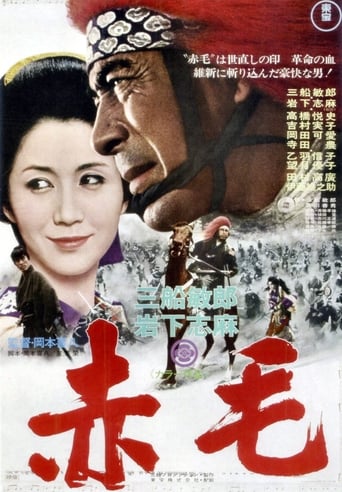poe426
Toshiro Mifune's turn as the stuttering Gonzo in RED LION is so out of character for the actor that his performance here really stands out. The gullible Gonzo (who fell out of a tree as a kid and presumably did some serious damage to his noggin) returns to his village, Sawando, wearing the mane of The Red Lion as a representative of The Imperial Army (which is on its way to facilitate what they refer to as "the world renewal," during which all taxes will be waived and all wrongs set right). Gonzo meets the pickpocket Sanji "The Wallet Collector," Hanzo, a "lai" (quick-draw swordsman), and is reunited with his long-lost love, Otomi (who was forced into prostitution when Gonzo was believed killed and tossed into a river). Says the naive Gonzo: "There's really gonna be a world renewal! It's gonna be a peasant's world!" (The Occupy Movement, anyone...?) "Those with money really DO have money," marvels one young woman sold into prostitution when she sees the loot hoarded by the corrupt town officials. But all is not well. "You're doomed," Gonzo's mother tells him: "No matter how many lives you've got!" The zaibatsu (plutocrats) won't allow the peasants to rise up. (The Occupy Movement, anyone...?) "Theory and real life can sometimes come into conflict," the old village sensei observes at one point. There are some interesting characters throughout RED LION and, as stated, Mifune takes a turn for the funny throughout- but his humorous antics give way late in the movie to some serious drama. RED LION is not to be missed.
sagemgr
This superb movie was my first political science training experience in my youth. I rank it in my top 10 favorite movies. I first saw it (English subtitle was "Red Lion")in its first showing (it was 35 years ago in L.A. or was it S.F.?)as a guest of the local distributer. I'm still affected by it's message of political betrayal. As a fan of T. Mifune, I was already conditioned by his superman samurai image. I kept expecting and then praying that his main character would toss aside his weaknesses and become the champion of justice and vanquish all evil. But, gasp, he doesn't and he is cut down. I still feel the blades in my own body as he is penetrated and dies. There is a lot in this movie but it was this aspect that grabbed me. What a fantastic gift of life instruction from Japan, to be on guard against betrayals in life. I recommend this film to everyone.
dinos_on_the_ark
I must agree with another review of this movie in that it is one of the best Samurai Films in America. I consider myself now a long time veteran of Samurai movies, and I own more than thirty of this genre. Red Lion has a perfect blend of quick-witted comedy, physical comedy, heart-wrenching drama, and in your face action. I have not seen a samurai movie yet to have such great humor and yet leave room to tear up at the end. This movie is not just for lovers of Samurai films, it is for everyone. There is a lot of violence and I don't recommend it as a family movie but if you love film, DO NOT MISS THIS MOVIE. You will laugh, you will cry, you will be at the edge of your seat, and you will be cheering "It's Alright! It's Alright! Forget it!"
rightoff70
Gonzo (Mifune Toshiro), a Robin Hood-like figure, shows up in his home town after several years' absence wearing a red wig like those worn by leaders of the imperial army. The son of a farmer, Gonzo has returned in supposed honor as a leader of the revolutionary imperial army, overthrowing the power of the Tokugawa shogunate and restoring power to the Emperor. Conflict and comedy result as Gonzo's military prowess and connection to the imperial army are called into question. Mifune carries the film in a role similar to his portrayal of Kikuchiyo in Kurosawa's Seven Samurai (1954).Those with little knowledge of the Meiji restoration might find some of the comedy difficult to grasp.I feel that there is an undercurrent of socialist revolution beneath the comedy in this film. The interplay between Gonzo and the local magistrate's samurai bodyguard, Hanzo, is the main vehicle for this agenda. Gonzo displays an unwavering faith that "the world is changing" and that the ruling elite will no longer be allowed to enslave the masses. Hanzo counters him with "the only thing that will change is the flower on the official crest."Okamoto's other films do not necessarily support this agenda, although Samurai Assassin (1965) and Sword of Doom (1966) both center on disillusioned ronin, like Hanzo, who participate in the fractious revolutionary activities leading up to the Meiji restoration out of interest for their personal advancement rather than idealistic belief in social progress.I found this a complex film, but one worth watching if you are interested in Japanese history or culture.
